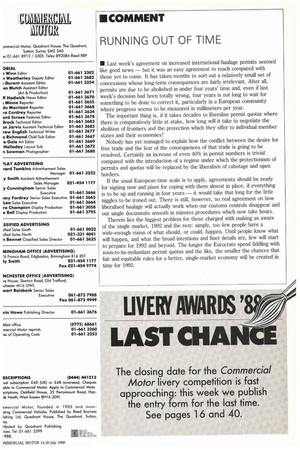• COMMENT RUNNING OUT OF TIME
Page 3

If you've noticed an error in this article please click here to report it so we can fix it.
• Last week's agreement on increased international haulage permits seemed like good news — but it was an easy agreement to reach compared with those yet to come. It has taken months to sort out a relatively small set of concessions whose Long-term consequences are fairly irrelevant. After all, permits are due to be abolished in under four years' time and, even if last week's decision had been totally wrong, four years is not long to wait for something to be done to correct it, particularly in a European community where progress seems to be measured in millimeters per year.
The important thing is, if it takes decades to liberalise permit quotas where there is comparatively little at stake, how long will it take to negotiate the abolition of frontiers and the protection which they offer to individual member states and their economies?
Nobody has yet managed to explain how the conflict between the desire for free trade and the fear of the consequences of that trade is going to be resolved. Certainly an increase of even 40% in permit numbers is trivial compared with the introduction of a regime under which the protectionism of permits and quotas will be replaced by the liberalism of cabotage and open borders.
If the usual European time scale is to apply, agreements should be ready for signing now and plans for coping with them almost in place, if everything is to be up and running in four years — it would take that long for the little niggles to be ironed out. There is still, however, no real agreement on how liberalised haulage will actually work when our customs controls disappear and our single documents smooth in minutes procedures which now take hours.
Therein lies the biggest problem for those charged with making us aware of the single market, 1992 and the rest: simply, too few people have a wide-enough vision of what should, or could, happen. Until people know what will happen, and what the broad intentions and finer details are, few will start to prepare for 1992 and beyond. The longer the Eurocrats spend fiddling with soon-to-be-redundant permit quotas and the like, the smaller the chances that fair and equitable rules for a better, single-market economy will be created in time for 1992.














































